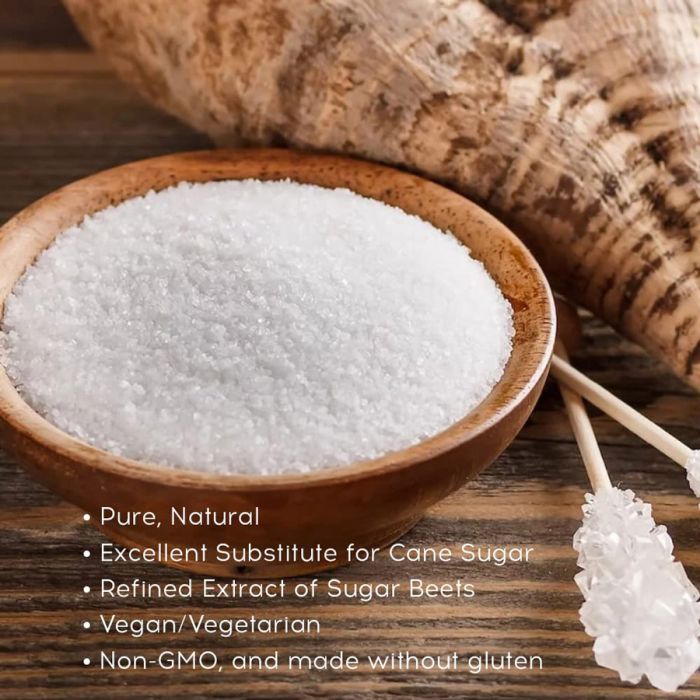Examining beet sugar vs cane sugar reveals distinctions in economic factors and availability.
An Extensive Consider the Conveniences and Uses of Beet Sugar Vs Cane Sugar for Sweetening Options
In the world of sweetening, both beet sugar and cane sugar deal distinct advantages and culinary functions, albeit with comparable nutritional accounts. While beet sugar flaunts a neutral taste suitable for different recipes, cane sugar enriches recipes with refined sugar undertones. The ecological factors to consider of their production are starkly various, repainting an intricate picture of sustainability. This juxtaposition invites a much deeper expedition right into just how each sugar effects not just our tastes however additionally the planet.
Beginnings and Processing Methods of Beet Sugar and Cane Sugar
Beet sugar and cane sugar, two predominant sweeteners, stem from very distinct plants and go through various processing techniques. Beet sugar is drawn out from the sugar beet, a root vegetable, largely grown in cooler environments.
Alternatively, cane sugar comes from the sugarcane plant, a tropical grass. Its processing starts with collecting the cane, crushing it to get the juice, and after that steaming this liquid to develop sugar crystals.
Nutritional Comparison: Beet Sugar Versus Cane Sugar

When contrasting the nutritional web content of beet sugar and cane sugar, it comes to be apparent that both kinds offer a comparable power value. Both beet and cane sugar are 99.9% pure sucrose, making them practically similar in terms of calorie web content and nutritional profile.
Nonetheless, slight distinctions might develop from the marginal trace components that continue to be after processing, though these are as well small to impact general health. As an example, cane sugar can retain traces of molasses, depending on the degree of refining, which might add small quantities of calcium, iron, and potassium. Beet sugar, on the other hand, normally undergoes a process that eliminates these trace components extra extensively, leading to an even purer form of sucrose.
Culinary Makes Use Of and Flavor Profiles
In spite of their nutritional resemblances, beet sugar and cane sugar split significantly in their culinary applications and flavor nuances. Beet sugar, originated from sugar beetroots, commonly has an extremely neutral preference, making it a recommended selection in baking where it effortlessly incorporates without altering the taste account of various other ingredients. beet sugar vs cane sugar. It liquifies quickly, which is beneficial in drinks and great desserts. On the various other hand, cane sugar, sourced from the sugarcane plant, typically lugs subtle hints of molasses, even in its polished kind. This can add a cozy, caramel-like touch to meals, enhancing dishes like cookies, cakes, and sauces where a richer taste is preferable.
Chefs and home cooks alike pick sugars based upon these features. While both sugars function similarly in terms of sweet taste and physical residential properties, the slight taste distinction can affect the result of a recipe substantially, directing the option in between beet and cane sugar based upon the desired outcome in culinary developments.
Wellness Ramifications of Consuming Beet and Cane Sugars
Although beet sugar and cane sugar are commonly made use of mutually in cooking and baking, their health ramifications can differ discreetly due to their distinctive handling approaches. Both sugars Get More Info give regarding the very same amount of calories and carbs per teaspoon, essentially using similar power contributions without any type of inherent dietary benefits. The refining process for each sugar can change the existence of trace minerals and substances, although these variations are usually marginal and not significant sufficient to impact one's health meaningfully.
The key health worry about both kinds of sugar pertains to their contribution to too much calorie consumption, possibly leading to click over here now weight gain, and associated illness like kind 2 diabetes and cardiovascular disease when consumed in big amounts. Therefore, despite the resource, moderation is type in taking in beet or cane sugars. Health and wellness experts frequently recommend restricting sugarcoated in any kind of kind to maintain optimal wellness end results.
Environmental Influence and Sustainability of Sugar Manufacturing

On the other hand, sugar beet processing often tends to create large quantities of pulp waste, which can be repurposed as pet feed or exchanged bioenergy, consequently minimizing some ecological influences (beet sugar vs cane sugar). Inevitably, the sustainability of sugar production hinges on adopting more environmentally friendly farming techniques and waste monitoring methods to reduce the eco-friendly footprint of both sugar types

Conclusion
To conclude, both beet and cane sugars supply beneficial sweetening options, each with distinctive benefits and drawbacks. While they are nutritionally similar, their growing effects and taste accounts vary considerably. Beet sugar is noteworthy for its click for more sustainability and neutral taste, whereas cane sugar is valued for its abundant flavor. Customers should take into consideration these elements, along with the ecological ramifications of sugar production, to make enlightened options concerning sugar usage that line up with culinary demands and moral worths.